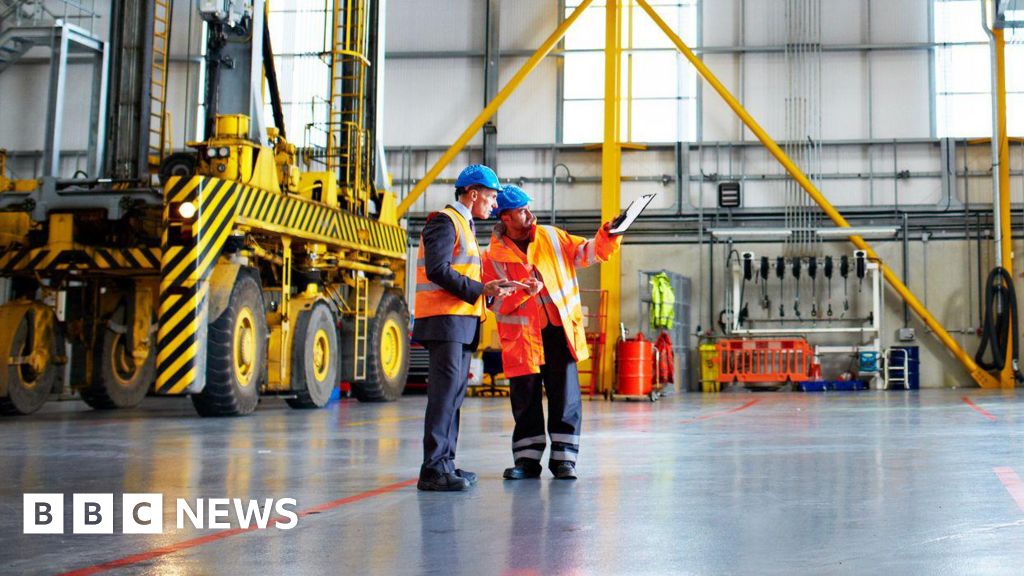Lowering energy costs for thousands of businesses by scrapping green levies will form a central part of the government’s new 10-year industrial strategy.
The plan, which may slash energy bills by up to 25% for more than 7,000 UK businesses, is set to be unveiled on Monday alongside other measures hoped to boost growth.
Prime Minister Sir Keir Starmer called the industrial strategy “a turning point for Britain’s economy” by supporting key industries where there is potential for growth.
Conservative acting shadow energy secretary Andrew Bowie criticised the plans, saying the UK needed “a serious approach to energy policy” that “tackles the root cause of our high energy prices”.
He said it was “astonishing” Labour was “finally admitting that the costs of net zero are so high that they’re having to spend billions of pounds of taxpayers’ money subsidising businesses’ energy bills to stop them going bust”.
Manufacturers in the UK currently pay some of the highest electricity prices in the developed world.
A new British Industrial Competitiveness Scheme will cut costs by up to £40 per megawatt-hour from 2027 for more than 7,000 manufacturing firms by exempting them from levies on bills including the renewables obligation, feed-in tariffs and the capacity market.
About 500 of the most energy-intensive firms, including the steel industry, chemicals and glassmaking, will also have their network charges cut.
Those firms currently get a 60% discount through the British Industry Supercharger scheme, which will increase to 90% from 2026.
Monday’s announcement will also contain measures to speed up the time it can take to connect new factories and projects to the energy grid.
The prime minister said the industrial strategy gave businesses “the long-term certainty and direction” they need to “invest, innovate and create good jobs that put more money in people’s pockets”.
It also aims to support the creation of more than one million new “well-paid jobs” over the next decade.
Other plans within the industrial strategy include:
- upskilling Britons and reducing reliance on foreign workers by spending an extra £1.2bn each year for skills by 2028-29
- attracting “elite global talent” to come and work in the UK with visa and migration reforms
- hiring more planners and streamlining application processes to reduce planning timelines and cut costs for developers
- boosting research and development spending to £22.6bn per year by 2029-30 to drive innovation – including £2bn for AI
The government said it will be focusing on eight specific sectors where the UK is already strong and therefore should have the potential for faster growth.
These sectors are advanced manufacturing, clean energy industries, creative industries, defence, digital and technologies, financial services, life sciences, and professional and business services.
A bespoke 10-year plan for five of the sectors will be published on Monday, but the defence, financial services and life sciences strategies will come later.
The announcement will come after latest figures showed the UK economy shrank by 0.3% in April – its worst contraction for a year-and-a-half.
Meanwhile, in April business groups raised concerns that the government’s Employment Rights Bill could hit growth at an uncertain time for the UK economy.
Chancellor Rachel Reeves said the industrial strategy will “see billions of pounds for investment and cutting-edge tech, ease energy costs, and upskill the nation”.
Manufacturer’s organisation Make UK’s chief executive Stephen Phipson said the government strategy set out plans to address “all three” major challenges facing industry – “a skills crisis, crippling energy costs and an inability to access capital for new British innovators”.
Trades Union Congress (TUC) general secretary Paul Nowak welcomed action “to reduce sky-high energy costs for manufacturers”.
He said: “For too long, UK industry has been hamstrung by energy prices far above those in France and Germany. It’s made it harder to compete, invest, and grow.”
Liberal Democrat business spokesperson Sarah Olney said government plans “must contain real solutions to bring down businesses’ sky-high energy costs and upskill workers around the country” and ministers must ensure small businesses “are right at the heart” of measures.


